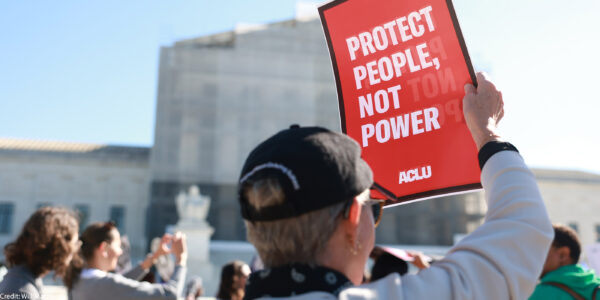
In honor of Fred Korematsu's 100th birthday, we're re-upping this piece from 2011 on his enduring civil libertarian legacy.
Last Sunday, we celebrated a new holiday declared by the state of California: “Fred T. Korematsu Day of Civil Liberties and the Constitution.” It was an opportunity to remember the simple courage, in the face of grave injustice, displayed by a quiet man who defied the World War II Executive Order in 1942 sending 120,000 Japanese-Americans to concentration camps. January 30 would have been Fred’s 92nd birthday.
Fred’s decision to suffer the public condemnation of arrest and imprisonment to do what was right, his decision to allow the ACLU of Northern California to represent him in the test case before the U.S. Supreme Court challenging the internment policy, and his role 40 years later in fueling the redress movement by reopening his case and seeking true vindication should continue to inspire us today, as should Fred's perseverance. It took Fred nearly 50 years not only to get his own conviction overturned but to finally secure redress for all of those who had been incarcerated with the passage of the Civil Liberties Act of 1988, which provided an official apology and reparations from the government and was signed into law by President Ronald Reagan.
Fred’s willingness to stand up against the treacherous collusion of racism, national security, and unaccountable power provides an important narrative in the ongoing political and legal fight against government abuse that, almost seven decades later, we still confront today. Indeed, Fred returned to the U.S. Supreme Court in 2004 to file a brief supporting a challenge to the prolonged indefinite detentions of prisoners in Guantanamo Bay as part of the so-called “war on terror.” Fred saw that like the Japanese-Americans of his time, those deemed to be “enemy combatants” today continue to be held without formal charges, without any fair hearing to determine guilt or innocence and often without the assistance of counsel.
One is reminded of Federal District Court Judge Marilyn Hall Patel's prescient opinion when she overturned Fred Korematsu's wartime conviction in 1984: "Korematsu stands as a constant caution that in times of war or declared military necessity our institutions must be vigilant in protecting constitutional guarantees. … It stands as a caution that in times of international hostility and antagonism, our institutions, legislative, executive and judicial, must be prepared to exercise their authority to protect all citizens from the petty fears and prejudices that are so easily aroused."
When Fred Korematsu stood hopelessly alone in 1942 — an American citizen vilified and imprisoned in his own country — he could not have imagined that he one day would be seen as a hero and be honored with the Presidential Medal of Freedom. Presenting him with the medal in 1998, President Clinton proclaimed, “in the long history of our country’s constant search for justice some names of ordinary citizens stand for millions of souls … Plessy, Brown, Parks … to that distinguished list … we add the name of Fred Korematsu.”
It is fitting that California should have an official state holiday in Fred Korematsu’s honor (the first statewide holiday honoring an Asian-American anywhere in the country). Unfortunately, it is a bittersweet celebration. For while we recognize the ultimate vindication of Fred Korematsu’s rights, we are reminded that post-September 11 America has slipped backwards. We will soon mark a decade of civil liberties abuses promulgated as a misguided policy that has once again forgotten the lesson taught by Fred’s heroic example: The sacrifice of liberty does not ensure public safety. Indeed, it may ultimately undermine it.
It would be a fitting honor on this “Fred Korematsu Day of Civil Liberties and the Constitution” to be inspired by Fred’s example and to reaffirm our commitment — not only to stand up but to join the march for justice — no matter how long or daunting the journey appears. Fred Korematsu would have insisted.
CORRECTION: A previous version of this post stated President Bill Clinton presented Korematsu with the Medal of Freedom in 1988. That was incorrect. He was awarded the Medal of Freedom in 1998.



